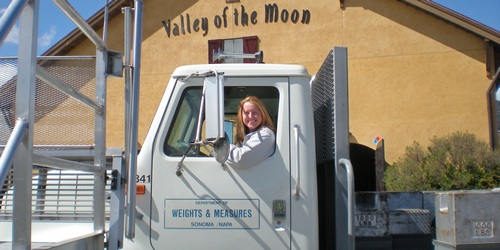Commercial Device Program

Government regulators, business and consumer groups have long recognized the importance of maintaining trust in the commercial transactions carried out in the local economy. Integrity in the process serves the interest of all parties. For this reason, commercial devices are highly regulated. California law defines “commercial devices” as devices legally authorized for the buying and selling of commodities and services. The accurateness of the device, their proper application and operation are critical in determining how much money will exchange hands between buyer and seller.
Consumer purchase many of the commodities they need and use over commercial devices. A typical family fuels the family vehicle with fuel metered over a measuring device. Consumers purchase fruits, vegetable and meats at the local grocery store over a scale, a type of weighing device. A device’s accuracy and proper operation will determine the money a seller will charge a buyer for many of these commodities.
Here are just a few of the commercial devices used to purchase goods and services in our local economy:
Weighing Devices
- Grocery Store Scales (computing scales)
- Shipping Scales (counter scales)
- Jewelers Scales
- Livestock Scales
- Vehicle Scales
- Hanging Scales
Measuring Devices Retail Motor Fuel Meters
- Utility Meters (electric, gas and water)
- Taxi Meters
- Liquid Propane Meters
- Fabric-Cord Meters
- Vehicle Meters
Electric Vehicle Charging Stations
Recently adopted regulations address how new installations of Electric Vehicle Charging Stations will be allowed to operate in California.
Today, electricity is being sold as a commodity and as motor fuel for electric vehicles Consumers are entitled to be fully informed about what they are being charged for every time they chose to plug their electric vehicle in to an electric vehicle charger.
New alternating current electric vehicle chargers installed after January 1, 2021 will be required to sell electricity by the unit of the kilowatt-hour and the customer must be informed of the price per unit per kilowatt-hour unit, prior to purchasing electricity. To read more about the topic, select the following link: Electric Vehicle Charging Stations.
Laws Governing Commercial Devices
California law requires commercial device, owner-operators, to register their devices with their local county weighs and measures authority. The device registration fees are set by state law and can be found in California's Business and Professions Code, Article 2, Section §12240.
Registration and inspection of "legal for trade" devices by local county officials ensure that the local market economy is on an even playing field for both buyers and sellers of goods and services.
Frequently Asked Questions
I use a scale to buy and sell fresh produce on my property. Do I have to register my scale?
Yes, any commercial device used to buy and sell or to charge for a service, are considered "legal for trade" devices" that must be registered with local weights and measures. This requirement is written in state law.
Can I use any scale to buy and sell produce or other goods?
No, commercial scales or "legal for trade" scales are strictly regulated and must be approved for commerce by either California's Division of Measurement Standards (DMS) Type Evaluation Program (CTEP) or the National Type Evaluation Program (NTEP). Approved scales are rigorously tested for required specifications and performance measurements. Once they are approved for commercial applications, the manufacturer of the device is given a certificate of conformance, which allows them to sell the device as a "legal for trade" device. These requirements apply to all commercial devices which includes weighing, measuring and timing devices.
How do I know if the scale I wish to buy is approved for commercial application ("legal for trade")?
You can verify this in any of the following ways.
- Ask the seller of the scale if it is a "legal for trade" scale. Ask for a copy of the certificate of conformance to verify the commercial status of the scale.
- You can visit the National Type Evaluation Program (NTEP) database to confirm the status of a scale. The database lists all types of devices approved for commercial application. You can visit the NTEP database here: https://www.ncwm.com/ntep-certificates
- Call our office and ask to speak to a Weights and Measures Inspector about a scale.
As a local business, how much will it cost me to register my scale?
That depends on the type and the number of commercial scales used to buy and sell commodities. Commercial device registration fees are authorized and set by California law. You can review our current fees list posted on our site: Weights & Measures Fees Schedule.
